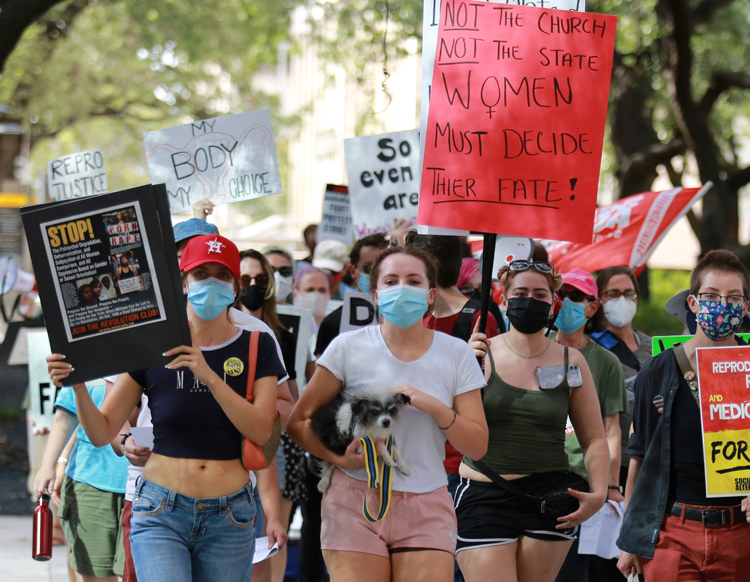DALLAS — The U.S. Supreme Court voted 5-4 to reject a temporary injunction requested by abortion providers to block a Texas law that went into effect Sept. 1. The law bans most abortions after six weeks of pregnancy. Unlike similar “heartbeat” laws adopted in other states, the Texas law authorizes any individual who chooses, as well as the state, to take steps to enforce it.
The unprecedented law allows anyone to seek damages of $10,000 or more from doctors, nurses, clinic volunteers and counselors, family members or anyone who they deem helped a woman obtain an abortion or raise funds to cover the procedure. The only exceptions are in cases of life-threatening medical emergencies, but not rape or incest.
Most women aren’t even aware they’re pregnant until after the sixth week.
The court’s majority decision not to block the law explicitly made no ruling on its constitutionality, saying its ruling was made only on procedural grounds. It also says women have access to legal protection in Texas state law. While some liberal media and politicians claim this decision means the fight for abortion rights is over, in fact the new Texas statute poses the need to step up the defense of women’s rights.
In a dissent joined by Justices Stephen Breyer and Elena Kagan, Chief Justice John Roberts agreed there were complicated procedural questions involved, but said the court should have suspended the Texas statute. He added that the court’s decision “is emphatic in making clear that it cannot be understood as sustaining the constitutionality of the law at issue.”
Protests against the law were organized around the state as it came into effect, including in Austin, Houston, Dallas, Edinburg and San Antonio. “We’re not going to stop fighting for our rights and for our bodies,” Valerie Beck told the press at the action in Austin.
“You aren’t stopping abortions, just making them unsafe,” read signs held at a protest of 60 in Austin.
“More actions are needed,” Socialist Workers Party campaign state chair Alyson Kennedy told the Militant.“SWP candidates across the country fight to defend clinics that provide family planning, including the right to safe and secure abortion. Defending this right is fundamental to a woman’s control of her own life and to the fight for full social, economic and political equality.”
“We need to organize independently of the Democratic and Republican parties who have done nothing to organize to fight growing attacks on women’s right to choose,” Kennedy said.
A “sanctuary for the unborn” campaign organized by East Texas Right-to-Life has resulted in almost 30 Texas towns adopting ordinances banning abortion. Planned Parenthood in Lubbock closed its abortion services in June after a judge ruled he did not have any legal grounds to stop a so-called sanctuary ordinance there.
In 1973 the Supreme Court, in its Roe v. Wade decision, legalized abortion, allowing the procedure up to the point when a fetus can sustain life outside the womb, then considered to be around 24 weeks. But from the moment the law was passed opponents of women’s rights have pushed new laws and legal challenges seeking to restrict that right, close family care clinics, harass health care providers and enact more and more limits on women’s access to exercise their right to choose.
Restrictions were made easier because of the character and content of the Roe v. Wade decision. It was based on medical criteria centered on “fetal viability,” and required a “doctor’s consent.” This limited abortion to a “health issue”— not a fundamental right based on women’s “equal protection of the law” guaranteed by the Constitution’s 14th Amendment.
Some 90% of U.S. counties had no abortion provider as of 2017. Since then several more clinics have been forced to close, hitting working-class women and women in rural areas especially hard.
“The road forward today is to mobilize supporters of women’s rights in a sustained educational and action campaign to expand support for women’s right to choose,” Kennedy said. “This fight is in the interests of the entire working class.”
Nationwide protests have been called for Oct. 2 by Women’s March and over 90 other organizations in defense of reproductive rights.


